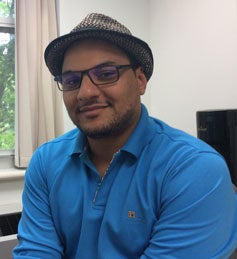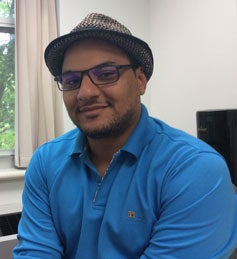 Mohamed Anis Ferchichi also sharing his culture with students, faculty
Mohamed Anis Ferchichi also sharing his culture with students, faculty
KINGSTON, R.I. – Oct. 2, 2015 – First, the good things about America. Cars stop for pedestrians. People are punctual. Professors strive to help students succeed.
Now the things Tunisian-born Mohamed Anis Ferchichi is adjusting to in America. A handshake instead of a hug. A high-fat diet. Ketchup.
“When I eat a lot of American food I don’t have the impression I’m full,” he says, with a chuckle. “So I eat more. I miss couscous.”
Ferchichi has been soaking up American culture since he arrived at the University of Rhode Island last month to teach Arabic for a year as a Fulbright Foreign Language Teaching Assistant.
The 30-year-old Kingston resident is a professor of English literature in his homeland and is working on his doctorate in English Renaissance Studies at the University of Manouba in Tunis, the country’s capital.
At URI, he’s contributing to the new Islamic and Mediterranean Studies program, which, besides language classes, also offers courses in Islamic Religion and Politics, Islamic History and Culture, Islamic Political Thought and more. Ferchichi’s supervisor is Alex Magidow, head of Arabic language instruction at URI.
The two-year-old Islamic studies program appeals to a broad range of students. Many are not language majors and, in fact, are studying theater, engineering, business, anthropology and political science. They all share a desire to learn a language spoken by 300 million worldwide.
“The Arab world is a huge and diverse place,” says Magidow. “Having Anis here gives our students an opportunity to meet someone from a country they might not know anything about – and learn about their own culture through his eyes.”
Besides teaching at URI, Ferchichi is also taking two classes – Discourse and Culture and American Culture and Literature – and sharing his background and views with students and faculty.
Ferchichi grew up in the North African country with parents who spoke French as well as Arabic. Tunisia was a French colony until it won independence in the mid-20th century, so French was – and still is – common.
By 7, Ferchichi was fluent in French. As a teenager, he taught himself English by listening to his favorite British pop band, the Spice Girls. It helped that his older brother listened to Madonna.
He majored in English literature at the prestigious Instiut Supérieur des Langues de Tunis and wrote his master’s thesis on English cross-cultural poetics and literary theory. The Fulbright program brought him to the United States for the first time.
Before coming to URI, he spent a week with other Fulbright scholars to learn about his new home. One suggestion from staffers: Don’t hug everyone you meet – or kiss them on the cheeks. A handshake will do.
“In Arab countries like Tunisia it’s acceptable to kiss people on the cheeks as a greeting, even when you meet them for the first time,” he says. “It’s considered a warm and friendly gesture.”
He was advised to tip in restaurants – there is no tipping in Tunisia – and obey road signs, which are often ignored in Tunisia: “Stopping at a red light in Tunisia can actually lead to an accident,” Ferchichi says. “Motorists behind you get impatient and pull ahead into traffic.”
Learning Arabic is challenging – and rewarding, he says. Students learn the standard version of the language that is used for reading and writing, but also study the spoken dialects used in day-to-day life. The alphabet is different, and reading and writing is from right to left.
“Arabic is a rich and multi-layered language that requires a commitment to learn,” says Ferchichi, who will also teach a course in Tunisian culture this spring. “Culture and language go hand-in-hand, so students also study the history, customs and modern life in the Arab world.”
Tunisia is one of the most advanced countries on the African continent, he says. The educational system is excellent and gender discrimination is rare, unlike in many other African nations. Tunisia is also more advanced on social justice issues, like gay rights.
After decades of repression, Tunisia became a democracy in 2011 – and is considered a success story from the Arab Spring revolutions. But two terrorist attacks recently rocked the nation.
In March, 21 tourists were gunned down at the Bardo National Museum in Tunis, and three months later 38 people, mostly Britons, were killed at a beach resort in Sousse. Islamic State militants claimed responsibility for the attacks. Since then, the Tunisian economy has suffered, with a million fewer tourists visiting – and that’s troubling since tourism is one of the country’s largest industries.
The government is doing its best to stop terrorism, Ferchichi says, but it’s difficult. Tunisia’s next-door neighbor is Libya, a volatile country that is a training ground for militant groups.
After his year at URI, Ferchichi will return home to finish his doctorate. He’s worried about whether he’ll fall back into his old ways, like always being late to appointments – a Tunisian habit.
One thing is certain: He’ll look both ways and then some when he crosses the road.
“You need to pray before crossing the street in Tunisia,” he says. “Drivers don’t stop for pedestrians. You’re on your own.”
Pictured above: Mohamed Anis Ferchichi, 30, of Kingston, a new Fulbright Language Teaching Assistant in Arabic at the University of Rhode Island.
Photo courtesy of Mohamed Anis Ferchichi.

